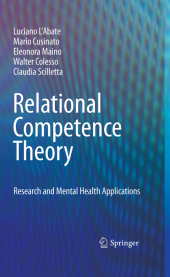 Neuerscheinungen 2014Stand: 2020-02-01 |
Schnellsuche
ISBN/Stichwort/Autor
|
Herderstraße 10
10625 Berlin
Tel.: 030 315 714 16
Fax 030 315 714 14
info@buchspektrum.de |

Mario Cusinato, Luciano L´Abate, Eleonora Maino
(Beteiligte)
Relational Competence Theory
Research and Mental Health Applications
2010. 2014. xvii, 326 S. 50 Tabellen. 235 mm
Verlag/Jahr: SPRINGER, BERLIN; SPRINGER NEW YORK; SPRINGER 2014
ISBN: 1-489-98208-6 (1489982086)
Neue ISBN: 978-1-489-98208-7 (9781489982087)
Preis und Lieferzeit: Bitte klicken
This book examines Relational Competence Theory - the study of traits that allow people to interact with each other effectively - with emphasis on its applicability to interventions, and examines what is robust and verifiable both in the lab and the clinic.
Relational competence-the set of traits that allow people to interact with each other effectively-enjoys a long history of being recorded, studied, and analyzed. Accordingly, Relational Competence Theory (RCT) complements theories that treat individuals´ personality and functioning individually by placing the individual into full family and social context. The ambitious volume Relational Competence Theory: Research and Mental Health Applications opens out the RCT literature with emphasis on its applicability to interventions, and updates the state of research on RCT, examining what is robust and verifiable both in the lab and the clinic. The authors begin with the conceptual and empirical bases for the theory, and sixteen models demonstrate the range of RCT concerns and their clinical relevance, including:
- Socialization settings for relational competence.
- The ability to control and regulate the self.
- Relationship styles.
- Intimacy and negotiation.
- The use of practice exercises in prevention and treatment of pathology.
- Appendices featuring the Relational Answers Questionnaire and other helpful tools.
Relational Competence Theory both challenges and confirms much of what we know about the range of human relationships, and is important reading for researchers, scholars, and students in personality and social psychology, psychotherapy, and couple and family counseling.
to Relational Competence Theory.- Background for a Hierarchical Theoretical Framework.- Internal and External Measures to Evaluate Models of the Theory.- Metatheoretical Assumptions.- Model1: The Width of Relationships.- Model2: The Depth of Relationships.- Model3: Socialization Settings for Relational Competence.- Theoretical Assumptions.- Model4: Ability To Love.- Model5: Ability To Control and Regulate Self.- Model6: Combination of Both Abilities.- Model7: The Triangle of Living.- Normative Theoretical Models.- Model8: Self-Identity Differentiation.- Model9: Styles in Relationships.- Model10: Interactions in Intimate Relationships.- Model11: Selfhood.- Model12: Priorities.- Clinically Relevant Models.- Model13: Distance Regulation.- Model14: A Pathogenic Drama Triangle.- Model15: Intimacy.- Model16: Negotiation.- The Improvement of Relational Competence.- Promotion of Relational Competence: Approaching Positive Experiences.- Prevention of Relational Incompetence: Avoiding Negative Experiences.- Treatment of Severe Relational Incompetence: One Approach Is Not Enough.- Conclusion.- Fully Functional Relational Competence.


